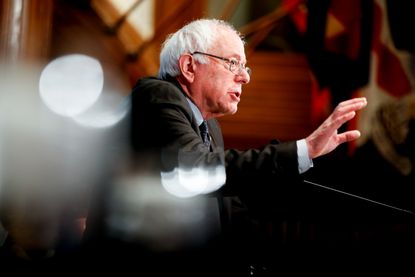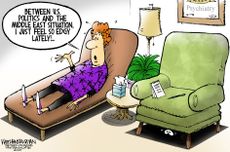Bernie Sanders is a totally legitimate presidential candidate. And it's time the press started treating him like one.
The media has all but tried to influence the outcome of the Democratic primary


In democracy, the voters decide who wins a presidential election. But the media has great influence over which candidates get serious consideration. So when it comes to Sen. Bernie Sanders of Vermont and the 2016 race, it's clear that he's getting a raw deal. It's long since time the press gave him the respect he deserves.
Jay Rosen, the New York University journalism professor, has a useful concept for describing the ideology of journalists: nested spheres of legitimacy. These have to do with the way ideas are presented in a piece of journalism. The idea of women's suffrage is presented as non-controversial, thus placed in the "sphere of consensus." The idea that aliens control the government, say, is presented as nuts, thus placed in the "sphere of deviance." The latter ideas are openly presented in the news as illegitimate or insane, if they are not ignored altogether.
What ideas go in which sphere is an inescapable part of journalism, though most reporters don't acknowledge they're doing it. And at the moment, the idea of Bernie Sanders as a candidate is getting placed in the deviant sphere. As Steve Hendricks noted, the media has mostly presented Sanders as a non-serious kook:
Subscribe to The Week
Escape your echo chamber. Get the facts behind the news, plus analysis from multiple perspectives.

Sign up for The Week's Free Newsletters
From our morning news briefing to a weekly Good News Newsletter, get the best of The Week delivered directly to your inbox.
From our morning news briefing to a weekly Good News Newsletter, get the best of The Week delivered directly to your inbox.
The Times, for example, buried his announcement on page A21, even though every other candidate who had declared before then had been put on the front page above the fold. Sanders's straight-news story didn't even crack 700 words, compared to the 1,100 to 1,500 that Marco Rubio, Rand Paul, Ted Cruz, and Hillary Clinton got. As for the content, the Times' reporters declared high in Sanders' piece that he was a long shot for the Democratic nomination and that Clinton was all but a lock. None of the Republican entrants got the long-shot treatment, even though Paul, Rubio, and Cruz were generally polling fifth, seventh, and eighth among Republicans before they announced. [Columbia Journalism Review]
Indeed, if anything Sanders is more credible than the likes of Paul and Cruz. He has risen markedly in the polls of late, where his support has about tripled since the end of last year. He's doing particularly well in New Hampshire, where a recent poll put him in second place at 18 percent support. As an opponent of the Iraq War and a longtime advocate for more progressive policy, he has a natural constituency in the liberal left, where he is genuinely admired.
Will he win? The odds are surely against him. Clinton's level of name recognition, money, and elite support — Sanders didn't even pick up an endorsement from the governor of his home state — makes it a very tough challenge. But it's conceivable that he could win. As Hendricks notes, dark horse challengers like Jimmy Carter have reached victory facing even longer odds.
But more to the point, it is simply inappropriate for powerful media figures to consistently bookend any mention of Sanders with comments about his inevitable electoral demise. Matt Yglesias, for example, presents Sanders' loss as so certain that if Clinton were to drop out, he would inevitably lose to Martin O'Malley.
It would be one thing to say that after February next year, when the primaries will have started. Statements like "he doesn't seem to have a realistic path to winning the nomination" could be grounded in realistic, near-term projections. But a lot can happen in eight months! And it's frankly ridiculous to present Sanders as a less credible candidate than O'Malley, who is currently polling behind Lincoln Chafee at 1.2 percent.
The constant presumptions about the electoral viability of some candidate amounts to an attempt to influence the outcome of the election, whether it's intentional or not. That might be a justifiable enterprise with someone like former Rep. Ron Paul, who has an extensive history of racism, homophobia, and anti-Semitism. But while Sanders has odd hair, and can be grouchy at times, he's not some random nutter from the Prohibition Party.
Bernie Sanders is a sitting United States senator who could easily finish second in the Democratic presidential primary. It is conceivable that he could even end up as Clinton's running mate. The fact that he is utterly fearless in advocating for Scandinavian-style democratic socialism is no reason to treat him like a kook.
Create an account with the same email registered to your subscription to unlock access.
Sign up for Today's Best Articles in your inbox
A free daily email with the biggest news stories of the day – and the best features from TheWeek.com
Ryan Cooper is a national correspondent at TheWeek.com. His work has appeared in the Washington Monthly, The New Republic, and the Washington Post.
-
 'A direct, protracted war with Israel is not something Iran is equipped to fight'
'A direct, protracted war with Israel is not something Iran is equipped to fight'Instant Opinion Opinion, comment and editorials of the day
By Harold Maass, The Week US Published
-
 Today's political cartoons - April 17, 2024
Today's political cartoons - April 17, 2024Cartoons Wednesday's cartoons - political anxiety, jury sorting hat, and more
By The Week US Published
-
 Arid Gulf states hit with year's worth of rain
Arid Gulf states hit with year's worth of rainSpeed Read The historic flooding in Dubai is tied to climate change
By Peter Weber, The Week US Published
-
 Arizona court reinstates 1864 abortion ban
Arizona court reinstates 1864 abortion banSpeed Read The law makes all abortions illegal in the state except to save the mother's life
By Rafi Schwartz, The Week US Published
-
 Trump, billions richer, is selling Bibles
Trump, billions richer, is selling BiblesSpeed Read The former president is hawking a $60 "God Bless the USA Bible"
By Peter Weber, The Week US Published
-
 The debate about Biden's age and mental fitness
The debate about Biden's age and mental fitnessIn Depth Some critics argue Biden is too old to run again. Does the argument have merit?
By Grayson Quay Published
-
 How would a second Trump presidency affect Britain?
How would a second Trump presidency affect Britain?Today's Big Question Re-election of Republican frontrunner could threaten UK security, warns former head of secret service
By Harriet Marsden, The Week UK Published
-
 'Rwanda plan is less a deterrent and more a bluff'
'Rwanda plan is less a deterrent and more a bluff'Instant Opinion Opinion, comment and editorials of the day
By The Week UK Published
-
 Henry Kissinger dies aged 100: a complicated legacy?
Henry Kissinger dies aged 100: a complicated legacy?Talking Point Top US diplomat and Nobel Peace Prize winner remembered as both foreign policy genius and war criminal
By Harriet Marsden, The Week UK Last updated
-
 Trump’s rhetoric: a shift to 'straight-up Nazi talk'
Trump’s rhetoric: a shift to 'straight-up Nazi talk'Why everyone's talking about Would-be president's sinister language is backed by an incendiary policy agenda, say commentators
By The Week UK Published
-
 More covfefe: is the world ready for a second Donald Trump presidency?
More covfefe: is the world ready for a second Donald Trump presidency?Today's Big Question Republican's re-election would be a 'nightmare' scenario for Europe, Ukraine and the West
By Sorcha Bradley, The Week UK Published